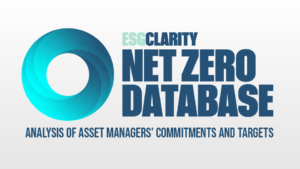The Taskforce on Nature-related Financial Disclosures (TNFD) recently released the third draft of its framework it hopes will be tested and widely adopted by the industry.
Speaking to ESG Clarity at COP27, TNFD executive director Tony Goldner said he hoped it would help facilitate growing ambition and disclosure on nature-based risk over time and that there has been “lots of interest from regulators in what we’re doing”.
He also said he was encouraged to see so many conversations at the conference this year involve nature considerations and discussed the social element of the framework.
See also: – All ESG Clarity’s COP27 coverage
The full transcript is below:
TG: TNFD is really there to respond to giving business and finance the tools to bring nature into their consideration. From a risk assessment perspective, but also in terms of disclosure. So what’s going to sit alongside the climate disclosures and then core financial statements? We have to bring nature into those disclosures, because at the moment – we keep hearing this from our discussions with banks and insurance companies, and companies across industries – there’s not a great awareness of the full range of dependencies that they have on ecosystem services and the assets that nature is providing to us.
Our job is to build something that works for lots of different market participants. So we’ve put out a full set of disclosures in draft, and we’ve also announced a flexible, adaptable approach to application of our recommendations so that people can get started.
Hopefully we see growing ambition and disclosure over time.
NT: And possibly mandating that disclosure as well?
TG: Well, there’s lots of interest from regulators in what we’re doing. Ultimately, that’s their decision, not ours. Again, we’re building the tool, but there has been some early signals from governments in different jurisdictions that they’re thinking about making nature disclosures mandatory alongside climate. And of course, some have already decided to mandate TCFD.
So those discussions are already underway. I can’t tell you when it’s going to happen, but we’ll focus on our job, which is building the best possible tool that we can and engaging with the existing standards bodies like ISSB and CDP and GRI and others, as well as government regulators – we’re all driving towards an integrated sustainability disclosure framework.
A robust framework on social factors
NT: That social element being arguably more prominent than in climate discussions, how are you going to ensure that your members using the framework are taking that seriously? We’re speaking here in a COP mired in human rights issues, so how does that remain robust?
TG: We have ongoing dialogue, which we started about six months ago, with Indigenous Peoples and local community representatives.
We’re keen to hear their voice and bring that into our thinking at the Taskforce. We’ve also been engaging with a number of civil society organisations. So we’re listening, we’re learning. We’ve also done some research on the existing standards around business and human rights. So the Ruggie Principles from the UN general principles that have been translated into the OECD guidelines.
There is actually a lot that’s around in terms of business standards and expectations when it comes to human rights and social impacts. So we are working our way through that. We’re interested in getting feedback on the application of those existing principles and approaches and how we can build that into the guidance. And ultimately, that would translate into a company required to describe the way it’s engaging those stakeholders consistent with some of those existing principles and standards.
We think that’s the most effective way we can do it, but we’ve got more research to do. I’m looking forward to further feedback from lots of stakeholders as we continue our work.
COP27 takeaways
NT: Just finally then, what are you hoping to bring back to the Taskforce from COP27?
TG: We’re working towards releasing our final recommendations in September next year. We’ve committed to putting out another hopefully full draft of the framework in March so that the market can see everything that TNFD is proposing. And then there’ll be another consultation period after that. And I think the key takeaways from this COP for me, talking to lots of companies and institutions that are here, is that nature is difficult.
They don’t have the capabilities internally now, everyone’s been building teams around climate. Now nature is coming. How are we going to deal with this? How much more complex set of issues? There’s lots more dimensions to be thinking about than seven gases. So we’ve got to provide something that encourages the market to move towards action quite quickly, and that’s going to require a flexible approach.








